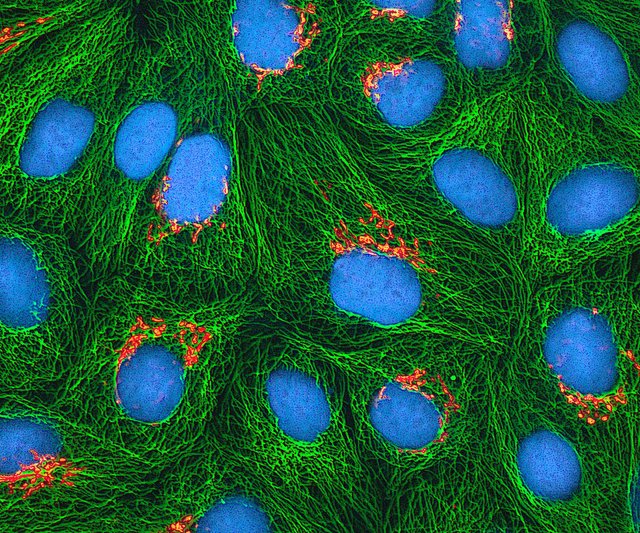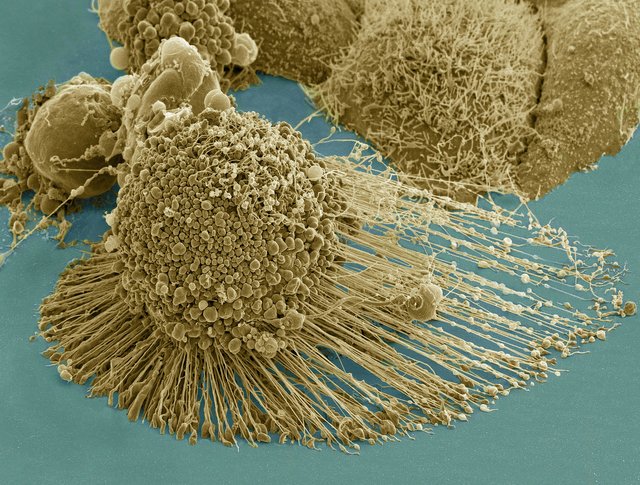
HeLa - the immortal cell line
In early 1951, Baltimorean Henrietta Lacks was diagnosed with cervical cancer. On February 8, 1951, biologist, George Otto Gey took two samples from Lacks' cervix surreptitiously - one sample was healthy, while the other was cancerous. No one every asked Lacks or her family for permission, neither did they ever notify.
Later, George Otto Gey succeeded in isolating Lacks' cancerous cells. These cells continued growing and multiplying outside of Henrietta's body, effectively creating a line of immortal cells. They continue to live on after Lacks died in late 1951, and reproduce to this very day.

Gey named the cell line Helen Lane or Helen Larson, but his deception was short lived. Either way, whether Helen Lane, Helen Larson or Henrietta Lacks, the cell line came to be called HeLa.
Right from the first polio vaccine test HeLa in 1953 to cancer, AIDS and gene mapping research today, HeLa cells have been an important part of countless research projects. There are over 75,000 scientific papers derived from HeLa research. To this day, 300 papers are published based every single month!
Since 1951, HeLa cells have steadily evolved, even being proposed as a new species. A subspecies of Homo sapiens dubbed Homo sapiens gartleri or Helacyton gartleri by Leigh Van Valen.
Needless to say, this is a highly sought after and very valuable cell line, with each vial of HeLa selling for well over $10,000 today. Or the billions of dollars earned from polio vaccinations. Or the thousands of other studies that have generated revenue. The HeLa cells have generated billions of dollars - though no one has really quantified this. Not to mention, this research has saved millions of lives.
But who owns HeLa?
The legal view
For centuries, law has clearly stated that a deceased human being cannot be owned. In the modern era, the law is fairly clear about ownership of cells. All humans have a right to donate cells, and to be informed of possible uses of the donated cells. The donors relinquish ownership of the cells the moment they leave their body. The donors have the right to know if the cells will be used for commercial purposes, but cannot claim any royalties or payments from further research.
Legally, Henrietta Lacks or her descendants cannot claim ownership from the point the cells left her body. They do, however, hold the right to know what the HeLa cells are being used for. Indeed, Francis Collins from the US National Institute of Health consulted with the Lacks family in 2013 and came to an agreement.
The labs that continue to grow HeLa cells can claim ownership and sell them.

Ethics
A more interesting debate would be an ethical one.
Is it ethical to extract a part of your body without your permission? Probably not. But what if Gey solicited permission first?
Do the donors then get to claim ownership of the cell line? Do they deserve royalties from commercial applications?
All interesting questions with a divided opinion!
Personally, I feel permission is a must. Donors should be informed in detail about what their biological material is being used for, how it is being used, and future applications. I don't believe in the runaway free market commercialisation of pharmaceuticals, but as it is happening, I'd expect the pharmaceutical company to pay the donor a small royalty suitable to the impact of the donation. Only up to a certain amount or time, of course.
What do you think? Would you donate parts of your body to science? Would you donate to a large pharmaceutical company? What would you expect in return?
Further reading -
The Immortal Life of Henrietta Lacks by Rebecca Skloot
http://www.nature.com/news/deal-done-over-hela-cell-line-1.13511
https://www.ncbi.nlm.nih.gov/pmc/articles/PMC3440234/
http://www.g3journal.org/content/3/8/1213
http://cell-lines.toku-e.com/Cell-Lines_1434.html
All images from Wikimedia.
Thank you for writing up this excellent, educational piece on Henrietta Lacks and the HeLa cervical cancer cell line.
As a bonus, and in addition to resteeming for exposure, we are awarding you a small 10 Steem Power deposit as a thank you for creating quality STEM related postings on Steemit. We hope you will continue to educate us all!
Downvoting a post can decrease pending rewards and make it less visible. Common reasons:
Submit
Death is inevitable but knowing that i am in the verge of death and i have something that could change and expand knowledge in the name of science, then yes i would donate parts of my body. And practically, i would also expect monetary remuneration in return for my family that i might left behind.
Downvoting a post can decrease pending rewards and make it less visible. Common reasons:
Submit
Great article @liberosist. In a sense the harvesting of cells from Henrietta Lacks may be an expression of the dark early days of cancer research in the United States. You might want to read about some of the figures around the founding of Sloan Kettering. Monstrous.
Downvoting a post can decrease pending rewards and make it less visible. Common reasons:
Submit
Of course, at the time research protocols were pretty lax. Non human species had basically no rights, and I'm sure Gey never thought he did anything wrong. Today, it feels pretty appalling.
Downvoting a post can decrease pending rewards and make it less visible. Common reasons:
Submit
This is a story that I wish people knew more about. Thanks for writing it up! I am not a big fan of how HeLa cells came to be.
Downvoting a post can decrease pending rewards and make it less visible. Common reasons:
Submit
Indeed, quite a dodgy origin story :)
Downvoting a post can decrease pending rewards and make it less visible. Common reasons:
Submit
Thanks for that! Nothing beats a well written post that leaves you with an interesting story to educate others around you.
Personally I feel that whatever you donate that could potentially help with the development of science and research should be concidered to the same extent this donation could impact someone's life or community.
Downvoting a post can decrease pending rewards and make it less visible. Common reasons:
Submit
Great article 😉
Downvoting a post can decrease pending rewards and make it less visible. Common reasons:
Submit